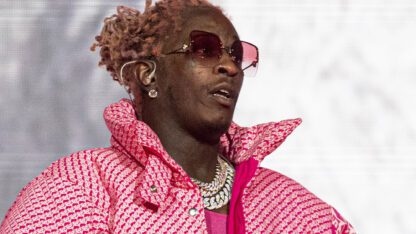This story was updated on Tuesday, Nov. 19, 2024, at 6:08 p.m.
Prosecutors finished calling witnesses Tuesday in the trial of the man accused of killing Georgia nursing student Laken Riley, and the defense began presenting its case but quickly ran into snags.
Jose Ibarra, 26, is charged with murder and other crimes in Riley’s February death. He waived his right to a jury trial, meaning the case will be decided alone by Athens-Clarke County Superior Court Judge H. Patrick Haggard.
The Feb. 22 killing on the University of Georgia campus added fuel to the national debate over immigration when federal authorities said Ibarra illegally entered the U.S. in 2022 and was allowed to stay in the country while he pursued his immigration case. Riley, 22, was a student at Augusta University College of Nursing, which also has a campus in Athens, about 70 miles (115 kilometers) east of Atlanta.
The prosecution rested its case Tuesday afternoon after calling more than a dozen law enforcement officers, Riley’s roommate and a woman who lived in an apartment with Ibarra to testify. The judge then asked Ibarra if he wants to testify and he said no.
Defense attorneys planned to call Ibarra’s brother, Diego Ibarra, to testify. Throughout the trial they asked prosecution witnesses questions that seem designed to create doubt about Jose Ibarra’s guilt by suggesting that his brother, Diego, could not be excluded as a suspect.
Diego Ibarra pleaded guilty in July to federal charges of possessing a fraudulent green card and is in federal immigration detention awaiting sentencing. Dressed in orange jail scrubs and with his wrists and ankles chained, he entered the courtroom and took the stand Tuesday afternoon.
But then one of Jose Ibarra’s defense attorneys, John Donnelly, told the judge that he’d just found out Diego Ibarra has a new attorney for his immigration case. He said he spoke to the attorney by phone and the attorney was two hours away but said he would advise his client not to testify.
Donnelly said he could call another immigration detainee who could testify about statements Diego Ibarra had made while in detention. But the judge said that could run into hearsay concerns. Since it was already late in the day, he decided to let the lawyers work things out overnight and to resume the trial Wednesday morning.
Earlier Tuesday, University of Georgia police Sgt. Sophie Raboud, who examined data from Riley’s phone, walked through a timeline of activity on Riley’s phone the morning she died and read text messages aloud.
Riley called her mother at 9:03 a.m. that morning, and by the time her mother called back about 20 minutes later, the student had encountered Jose Ibarra on a wooded running trail, according to trial testimony. Prosecutors have said Ibarra killed Riley after a struggle, and data from Riley’s smartwatch shows her heart stopped beating at 9:28 a.m.
After Riley failed to answer the phone, her mother, Allyson Phillips, texted her several times, casually at first but then with increasing concern, according to data pulled from Riley’s phone.
At 9:37 a.m., her mother texted, “Call me when you can.” Phillips called twice, and when her calls went unanswered, she texted her daughter at 9:58 a.m., “You’re making me nervous not answering while you’re out running. Are you OK?” Phillips texted again at 11:47 a.m., writing, “Please call me. I’m worried sick about you.” She and other family members continued to call Riley.
Raboud also testified about video from surveillance cameras near the wooded trail, and Phillips and some other family members and friends cried as video played showing Riley running on the trail in her final moments.
Prosecutor Sheila Ross said during her opening statement that Ibarra had gone out “hunting for females” that morning in February and that he killed Riley after a struggle when she “refused to be his rape victim.” Law enforcement officers testified there was no evidence that Riley was sexually assaulted.
Dr. Michelle DiMarco, a GBI medical examiner, conducted the autopsy of Riley’s body and testified that Riley had injuries, including scrapes, bruises and cuts, to her head, neck, torso, abdomen, left hand and left leg. Her injuries included eight cuts to her head, including one that fractured her skull, DiMarco said.
Prosecutors have said that Ibarra hit Riley in the head with a rock and DiMarco said the injuries “could be consistent with a rock.” A GBI specialist testified Riley’s DNA was found on two rocks at the scene.
The DNA specialist, Ashley Hinkle, also testified that testing showed that a blue jacket that police recovered from a trash bin at Ibarra’s apartment complex had a blood stain that tested positive for Riley’s DNA and that Ibarra’s DNA was also on it. Ibarra’s DNA was also found under the fingernails of Riley’s right hand.
Defense attorney Dustin Kirby said in his opening that Riley’s death was a tragedy and called the evidence in the case graphic and disturbing. But he said there is not sufficient evidence to prove that his client killed Riley.
Defense attorneys called three other witnesses before trying to put Diego Ibarra on the stand. One was a woman who lived next door to the Ibarras. Stephanie Slaton testified that the evening of the day Riley was killed, Diego Ibarra asked her what was going on because there were a lot of police around.
Slaton testified that she told him someone had been killed nearby and urged him to tell police anything he knew. She said he spoke into a translation app on his phone and showed her the screen, which said, “If you tell them, I will tell them you did it and then I will kill you, too.”
But under questioning by Ross, Slaton said Diego Ibarra never told her he or his brother had killed Riley. She also acknowledged she’d been drinking that day and that she had been involved in an intimate relationship with Diego Ibarra and had been angry at him because she thought he was also involved with another woman.
A police officer called to testify by the defense said he found a pile of discarded clothing near the Ibarra’s apartment complex the day after the killing but that it looked like it had been there a while. The defense also called a man who’d been out running the day Riley was killed and saw a suspicious man but described him as being taller and skinnier than Jose Ibarra.









